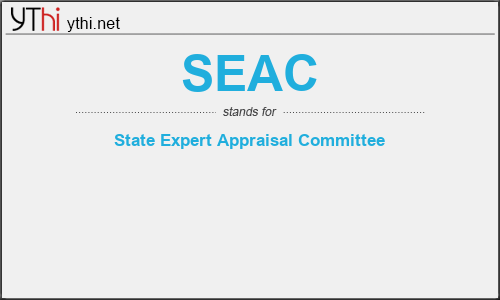What does SEAC mean? What is the full form of SEAC?
The Full Form of SEAC is State Expert Appraisal Committee.
THE NATIONAL Green Tribunal has said that the Ministry of Environment, Forests and Climate Change should appoint only those people as chairpersons and members of expert appraisal committees who have “expertise and experience” in environment-related issues. In a judgement delivered on July 17, the court also said that the expertise of chairpersons should be in the area with which the committee is concerned.
Expert appraisal committees (EAC) exist at the Union as well as state levels (state expert appraisal committee or SEAC) to advise the government on environmental clearance of development projects. The directions issued by the Justice Swantanter Kumar-headed principal Bench of the National Green Tribunal (NGT) are applicable to committees at both the levels.
The role of EAC is integral to the process of granting environmental clearance to development projects. According to the Environment Impact Assessment (EIA) Notification, 2006, evaluation of proposals involves four steps: screening, scoping, public hearing and appraisal. EAC/SEAC are involved in various capacities in all the stages, except for public hearing. The selection criteria for EAC chairpersons are also given in the notification. “The [NGT] directions follow a close reading of the EIA Notification, 2006, where the criteria for choosing the EAC chairperson specify that he/she should be someone with expertise in public administration/management,” says Neeraj Vagolikar of non-profit Kalpavriksh, a petitioner in the case. The court observed that the selection criteria are not appropriately outlined and has asked the Union Ministry of Environment, Forests and Climate Change (MoEFCC) to revise it. Till the revision is done, no new appointment can be made, says the order.
The NGT order came in response to a petition originally filed before the Delhi High Court in 2011. Apart from Kalpavriksh, Goa Foundation and Manoj Mishra, retired chief conservator of forests of Chhattisgarh, are also party to the petition. The case was transferred from the High Court to NGT in April 2013.
The petition held that the primary objective of MoEFCC is to protect the environment and EACs, being the key bodies advising the ministry on environmental clearances, have a vital role. But these committees have given several controversial decisions because the chairpersons lacked requisite expertise, states the petition.
The reason behind this is the change in the selection criteria of EAC chairpersons. Since the first draft EIA notification of 1992 where the emphasis was on expertise, the focus has shifted to managerial ability (see ‘Changing criteria’). However, MoEFCC says the criteria, as specified in the EIA Notification of 2006, have been modified through a ministry notification issued in October 2007. But it is worth noting that the modified provision still retains the clause “public administration or management” expert for selectingEAC members.
SEAC
means
State Expert Appraisal Committee![]()
Translate State Expert Appraisal Committee to other language.


Leave a Reply
You must be logged in to post a comment.